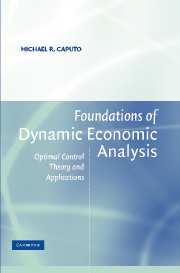Book contents
- Frontmatter
- Contents
- Foreword by Eugene Silberberg
- Preface
- 1 Essential Elements of Continuous Time Dynamic Optimization
- 2 Necessary Conditions for a Simplified Control Problem
- 3 Concavity and Sufficiency in Optimal Control Problems
- 4 The Maximum Principle and Economic Interpretations
- 5 Linear Optimal Control Problems
- 6 Necessary and Sufficient Conditions for a General Class of Control Problems
- 7 Necessary and Sufficient Conditions for Isoperimetric Problems
- 8 Economic Characterization of Reciprocal Isoperimetric Problems
- 9 The Dynamic Envelope Theorem and Economic Interpretations
- 10 The Dynamic Envelope Theorem and Transversality Conditions
- 11 Comparative Dynamics via Envelope Methods
- 12 Discounting, Current Values, and Time Consistency
- 13 Local Stability and Phase Portraits of Autonomous Differential Equations
- 14 Necessary and Sufficient Conditions for Infinite Horizon Control Problems
- 15 The Neoclassical Optimal Economic Growth Model
- 16 A Dynamic Limit Pricing Model of the Firm
- 17 The Adjustment Cost Model of the Firm
- 18 Qualitative Properties of Infinite Horizon Optimal Control Problems with One State Variable and One Control Variable
- 19 Dynamic Programming and the Hamilton-Jacobi-Bellman Equation
- 20 Intertemporal Duality in the Adjustment Cost Model of the Firm
- Index
- References
14 - Necessary and Sufficient Conditions for Infinite Horizon Control Problems
Published online by Cambridge University Press: 05 June 2012
- Frontmatter
- Contents
- Foreword by Eugene Silberberg
- Preface
- 1 Essential Elements of Continuous Time Dynamic Optimization
- 2 Necessary Conditions for a Simplified Control Problem
- 3 Concavity and Sufficiency in Optimal Control Problems
- 4 The Maximum Principle and Economic Interpretations
- 5 Linear Optimal Control Problems
- 6 Necessary and Sufficient Conditions for a General Class of Control Problems
- 7 Necessary and Sufficient Conditions for Isoperimetric Problems
- 8 Economic Characterization of Reciprocal Isoperimetric Problems
- 9 The Dynamic Envelope Theorem and Economic Interpretations
- 10 The Dynamic Envelope Theorem and Transversality Conditions
- 11 Comparative Dynamics via Envelope Methods
- 12 Discounting, Current Values, and Time Consistency
- 13 Local Stability and Phase Portraits of Autonomous Differential Equations
- 14 Necessary and Sufficient Conditions for Infinite Horizon Control Problems
- 15 The Neoclassical Optimal Economic Growth Model
- 16 A Dynamic Limit Pricing Model of the Firm
- 17 The Adjustment Cost Model of the Firm
- 18 Qualitative Properties of Infinite Horizon Optimal Control Problems with One State Variable and One Control Variable
- 19 Dynamic Programming and the Hamilton-Jacobi-Bellman Equation
- 20 Intertemporal Duality in the Adjustment Cost Model of the Firm
- Index
- References
Summary
In many optimal control problems in economics, the planning horizon is assumed to be of infinite length. This means that the person who solves such an optimal control problem is choosing the time path of the control variables for eternity at the initial date of the planning horizon. At first glance, the infinite horizon assumption may seem to be an arbitrary and extreme one, but in fact it is often less extreme than it first appears. For example, it is often just as arbitrary and extreme to assume that a firm would stop planning at some finite date in the future. This issue is especially pertinent if one takes the view of a planner making decisions for an entire economy. Thus the infinite horizon assumption is no more or less extreme, in general, than the assumption of a finite planning horizon. In the end, the choice of the horizon length should be made based on the appropriateness of the assumption for the economic question under consideration as well as the qualitative implications it implies, and their consistency with observed behavior. It is also important to point out that infinite horizon control problems have certain properties that help to considerably simplify the analysis of them that can render an otherwise intractable problem tractable, as this chapter and several others will demonstrate. On the other hand, infinite horizon control problems present two bodacious difficulties of their own.
- Type
- Chapter
- Information
- Foundations of Dynamic Economic AnalysisOptimal Control Theory and Applications, pp. 381 - 411Publisher: Cambridge University PressPrint publication year: 2005



